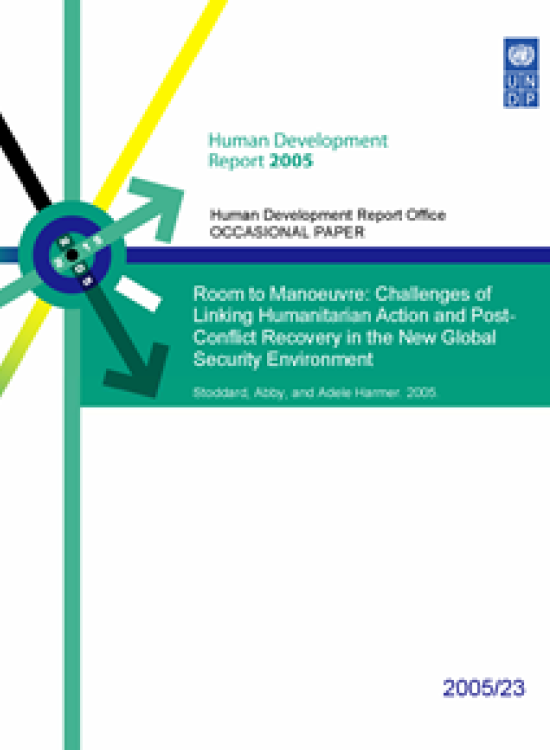Room to Manoeuvre
Challenges of Linking Humanitarian Action and Post- Conflict Recovery in the New Global Security Environment

Download Report by Language
Document
hdr2005stoddardabbyandadeleharmer23.pdf
(194.41 KB)
Citation
Stoddard, Abby, Harmer, Adele. 2005. Room to Manoeuvre: Challenges of Linking Humanitarian Action and Post- Conflict Recovery in the New Global Security Environment. New York.
Room to Manoeuvre
Challenges of Linking Humanitarian Action and Post- Conflict Recovery in the New Global Security Environment
Posted on: January 01, 2005
Humanitarian providers play vital roles in countries undergoing and emerging from conflict, filling crucial needs and representing an important part of the international work toward stabilization and recovery. Never a politically simple matter, despite the apolitical humanitarian ideal, the policies and practices of humanitarian action now face new and intensified challenges in the current international environment. One set of challenges has to do with the uncertain role of humanitarian actors in transitional or post-conflict situations. International assistance actors have arrived at some points of consensus regarding what makes effective programming in transitions, and the necessary shift from life-saving to life-normalizing and life-improving interventions. However, dilemmas arise regarding how to preserve an independent humanitarian presence within a broader political mission, and whether and how humanitarians are to engage with state structures, political actors, and militaries.Following on from these issues is the more pointed debate over the erosion of neutral humanitarian space as a result of recent political and security developments. The US-led Global War on Terrorism (GWOT), situations of asymmetric warfare and counterinsurgency operations, and the increased blending of civil and military responses have created an environment in which humanitarians see their core neutrality principle increasingly compromised. And finally, at the most immediate level, humanitarian actors struggle also with the erosion of their physical security – most certainly in the cases of Afghanistan and Iraq, and possibly as a general trend. Whether the risk of violence for humanitarian actors has increased over time is not yet known definitively, pending a comprehensive compiling and analysis of the data. What is not in question, however, is that the UN organizational response to the security challenge has had major implications for its own agencies’ humanitarian access and methods of operations in some places, and is creating ripple effects throughout the entire humanitarian system.

